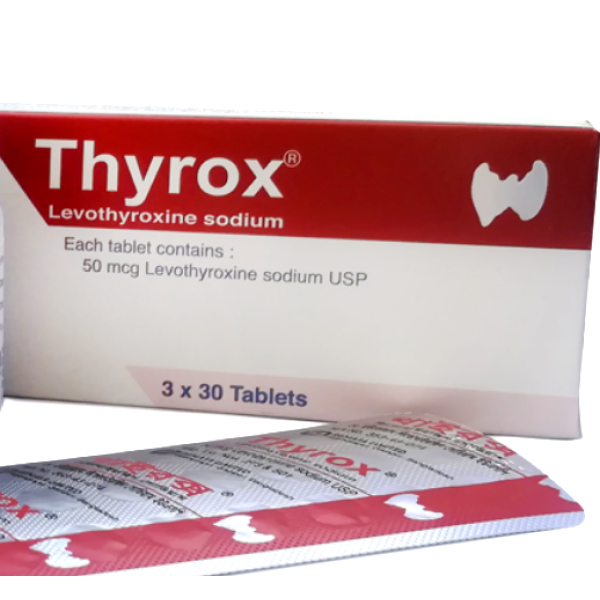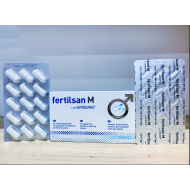
- Stock: In Stock
- Brand: Renata
- Product ID: Levothyroxine Sodium
100% Secure Payment

Thyrox 50 mcg Tablet
Indications
As replacement therapy in hypothyroidism of any aetiology. Replacement therapy should not be instituted in transient hypothyroidism during the recovery phase of subacute Thyroiditis.
For the suppression of Thyroid Stimulating Hormone (TSH) levels in the presence of goitres, nodules and after radiological and/or surgical treatment of Thyroid cancer.
For the suppression of the goitrogenic effects of other drugs such as Lithium.
As a diagnostic aid in suppression tests.
Pharmacology
This tablet contains synthetic Levothyroxine (also called Thyroxine or T4) which is identical to the natural hormone T4, produced in the Thyroid gland. About 30% of T4 is converted to the much more active Triiodothyronine (T3) in peripheral tissues. TBG (Thyroxine Binding Globulin) is the major carrier of T4. This binding protects T4 from metabolism and excretion resulting in its long half-life in the circulation. Only about 0.03% of total T4 in plasma is unbound. The half-life of elimination of T4 is 6 to 7 days. In hyperthyroidism, the half-life is shortened to 3 or 4 days, whereas in hypothyroidism it may be 9 to 10 days. In conditions associated with reduced protein in plasma as in nephrosis or hepatic cirrhosis or when binding to protein is inhibited by certain drugs the half-life of T4 may be shortened. The liver is the major site of degradation of Thyroid hormones. T4 is conjugated with Glucuronic and Sulphate conjugates through the Phenolic hydroxyl group and excreted in the urine.There is an enterohepatic circulation of the Thyroid hormones, since they are liberated by hydrolysis in the intestine and reabsorbed. Because of the long half-life of T4, a steady blood level of the biologically more active T3 can be obtained from one single daily dose of Levothyroxine. Therefore, variations in the therapeutic effect are unlikely once the correct dosage has been established.
Interaction
Concomitant use of Thyroid hormones with any of the following drugs or substances may lead to the occurrence of clinically relevant interactions:
Oral anticoagulants: Thyroid hormones may enhance the activity of oral anticoagulants.
Antidiabetic drugs: Thyroid hormones may cause increases in insulin or oral hypoglycaemic drug requirements.
Digitalis preparations: Thyroid hormones may alter the requirement for Digitalis preparations.
Cholestyramine: The absorption of Thyroid hormones may be decreased by Cholestyramine; therefore, there should be an interval of at least 4 hours between administration.
Phenytoin: Phenytoin appears to enhance the metabolism of Thyroid hormones and may also displace T4 from TBG.
Foods: In order to avoid irregular absorption Levothyroxine tablets should be taken preferably at a fixed time on an empty stomach with some fuilds. Simultaneous intake of food may decrease the absorption of T4.
Contraindications
Untreated subclinical or overt Thyrotoxicosis of any etiology, Acute Myocardial Infarction, Uncorrected Adrenal failure.
Side Effects
Too high a dosage may lead to symptoms of hyperthyroidism such as tachycardia, nervousness, tremor, headache, flushing, perspiration and loss of weight. If necessary, treatment can be interrupted for a few days and then be resumed at a lower dosage.




























%20Pvt.%20Ltd./Movicol-Oral-Powder-190x190.jpg)
